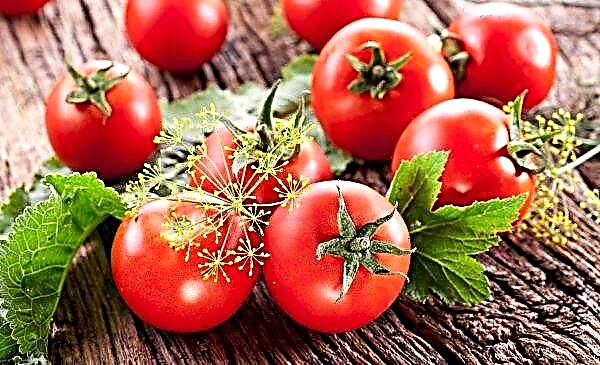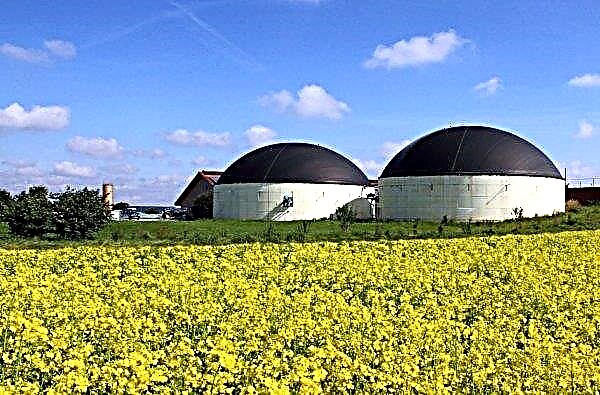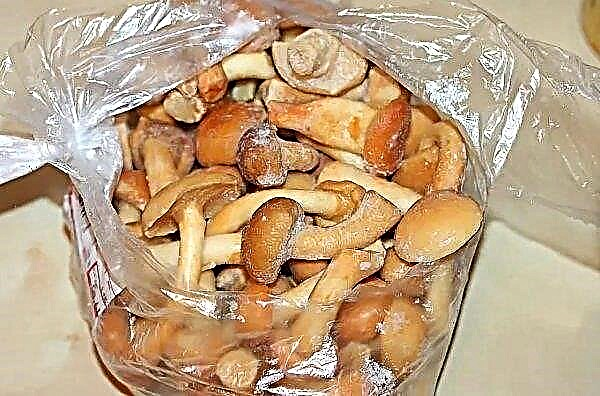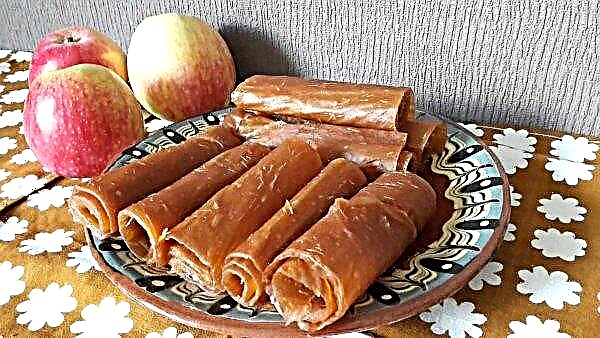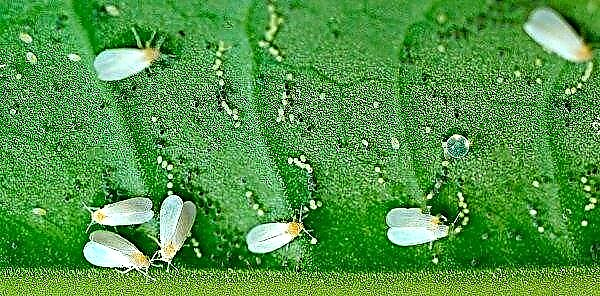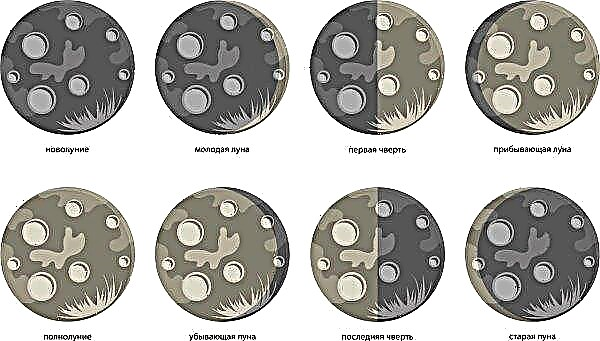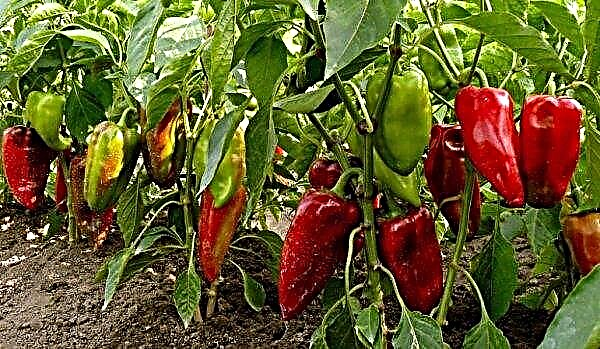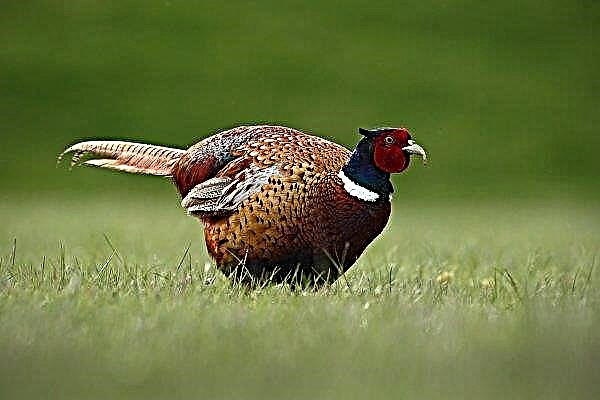When growing dill, its stem is most often used for food, and fragrant umbrellas of inflorescences are a popular spice for marinades. But in folk medicine, small seeds of this plant are often used to prepare medicinal infusions and decoctions. They help in the treatment of many diseases, and in particular those arising from the digestive organs. In the article, we consider the rules for the use of dill seeds and recipes for preparing drugs from them for the treatment of pancreatic diseases (pancreatitis).
Chemical composition
Dill seeds contain a large amount of minerals, vitamins and amino acids.
Did you know? The medicinal properties of dill were known 5,000 years ago. Healers of ancient Egypt often used this plant to treat various diseases.
Their calorie content is 305 kcal per 100 g of product, while the fruits contain:
- proteins - 16 g;
- fats - 14.5 g;
- carbohydrates - 55.2 g;
- water - 7.7 g;
- dietary fiber - 21.1 g;
- ash - 6.6 g.
 The chemical composition of seeds also includes:
The chemical composition of seeds also includes:- vitamins (A, B1, B2, B6, B9, C, PP);
- macrocells (magnesium, phosphorus, calcium, potassium, sodium);
- trace elements (manganese, copper, iron, selenium, zinc);
- essential amino acids (lysine, valine, arginine, isoleucine, methionine, etc.);
- fatty acids (omega-3 and omega-6);
- saturated fatty acids (lauric, palmitic, etc.);
- monounsaturated fatty acids (Omega-9, palmitoleic);
- polyunsaturated fatty acids (linoleic and linolenic).
Properties of dill seeds for the human body
Dill seeds are natural products that contain many vitamins and useful compounds, so they can be not only an ingredient in the preparation of various dishes, but also a multifunctional treatment for many diseases.
But if used improperly, the fruits of this fragrant plant can harm the body and cause a serious malfunction in some organs. Consider the useful and harmful properties of the described product in more detail.
Benefit
The rich chemical composition of dill seeds allows you to use them for the preparation of medicines according to traditional medicine recipes.
- Useful product features include:
- treatment of bacterial and fungal infections;
- caries prevention;
- digestion improvement;
- stimulation of the production of breast milk during lactation in women;
- elimination of edema;
- appetite improvement;
- relieving painful cramps;
- strengthening the nervous system;
- normalization of sleep;
- normalization of high blood pressure;
- removal of toxins from the body;
- removal of inflammation of the mucous membranes;
- cancer development prevention.
Important! Water with dill is an effective way to get rid of painful colic in infants: it is given to children from the first month of life.
Harm and contraindications
- The negative qualities of seeds include the following:
- the ability to cause food allergies;
- lowering blood pressure with hypotension;
- increased bleeding, if any;
- increased tone of the uterus in women;
- visual impairment.
Given the above harmful properties of seeds, they can not be used for treatment in such cases:
- increased acidity of gastric juice;
- the presence of allergies to dill;
- stomach ulcer;
- low blood pressure;
- coagulation dysfunction;
- menstruation or pregnancy.

Harvesting seeds for treatment
To prepare medicines according to popular recipes, you can buy ready-made dill seeds in a pharmacy or collect and prepare them yourself. In the second case, you need to follow some recommendations in order for the collected product to retain the maximum number of healing properties.
Consider the basic rules for harvesting seeds for the preparation of medicines:
- the collection of raw materials can only be carried out from those plants that are away from busy roads and industrial enterprises with emissions of harmful substances;
- for medicinal purposes, you can use only the seeds of dill fragrant and pharmacy;
- the product is harvested in late summer and early autumn - it is at this time that the fruits of the plant ripen;
- plant umbrellas are carefully cut with a knife and bundled;
- the resulting bundles are dried in a warm room, and then threshed;
- Finished grains should be stored in glass containers with screw caps for no more than 2 years.
Did you know? In the Middle Ages, fragrant branches of dill were considered an effective amulet from witchcraft.
Dill Seed Medication Prescriptions
Dill grains can be used as an independent ingredient for the preparation of medicinal decoctions or combine them with other medicinal herbs.
If you clearly observe the indicated proportions and use the medicines from the fruits of the plant in question correctly, then they help get rid of many unpleasant symptoms that occur with pancreatitis. Next, consider the most popular traditional medicine recipes using dill.
Infusions

20 minutes
Nutritional value per 100 g:
- Grind the fruit thoroughly in a mortar.
- Pour water into the stewpan and bring it to a boil on the stove.
- Pour crushed seeds into a small saucepan and pour them with water.
- Cover the container and wrap. Leave the mixture to infuse for 1 hour.
- Strain the infusion through a sieve before use.
For the treatment of pancreatic diseases, the resulting infusion is divided into portions and consumed 3 times a day for half an hour before eating. A single dose is 2 tablespoons.
Important! The total amount of infusion used should not exceed 50 ml per day.
To normalize the pancreas, it is also possible to use an infusion of green mint leaves, hawthorn and dill, immortelle and chamomile flowers, mixed in the same proportions. The infusion is taken one hour after eating in small portions, 100 ml each. It is allowed to drink no more than 300 ml of the drug per day.
Decoctions

25 minutes
Nutritional value per 100 g:
- Grind the fruits of the plant in a mortar. You can use a coffee grinder for this purpose.
- Pour water into a stewpan and boil.
- Add crushed seeds to boiling water. Cook over low heat for several minutes.
- Leave the broth at room temperature until completely cooled, strain through a sieve before use.
The prepared broth should be taken in small portions, 50 ml, 30 minutes before meals. The number of receptions per day is not more than four.
For the treatment of pancreatitis, medicinal infusions are also used, which include such ingredients:
- dill grains, corn stigmas, dandelion root, knotweed, St. John's wort, violet, celandine (in a ratio of 1: 1: 1: 1: 1: 1: 2). The broth should be drunk in portions of 100-150 ml 3 times a day 30 minutes before meals;
- valerian and calamus root, yarrow, dill seeds, nettle leaves (in a ratio of 1: 1: 1: 3: 3). The drug is consumed 3-4 times a day about an hour after a meal. The volume of a single portion is 100 ml.
Did you know? In ancient Rome, the dill aroma was considered as pleasant as the aroma of roses, so its fragrant stems were used to decorate homes.
Powder

5 minutes
Nutritional value per 100 g:
- Dill the fruits of dill thoroughly in a mortar with a pestle.
- Mix the resulting powder with honey.
This tool is recommended to be taken 2-3 times a day for 1 teaspoon, washed down with water. In order to fully preserve the healing properties of raw materials, the powder must be prepared immediately before use. Its advantage is the speed of cooking.
Consumption rates
When treating pancreatic diseases using the listed folk remedies from dill seeds, you need to monitor the condition of your body and in no case exceed the indicated doses of drugs. An overdose can have negative consequences for the body and cause significant harm to it.
Important! For adults, the permissible intake of dill seeds is about 30 g per day. Children are allowed to give only a decoction of seeds in the amount of 1 teaspoon per day.
If this dosage is exceeded, negative symptoms appear:
- general weakness of the body;
- slight dizziness;
- severe nausea;
- pallor of the skin;
- lowering blood pressure;
- Strong headache;
- feeling unwell.
If such symptoms appear, they cannot be ignored - in this case, it is recommended to immediately stop taking the above-mentioned folk remedies and immediately consult a doctor.
What are the benefits of dill seeds for the pancreas?
With proper use, the fruits of the plant in question can have a beneficial effect on the human body, helping to eliminate many diseases of the digestive system.
Let us consider in more detail how the seeds of this plant are useful for the pancreas:
- elimination of painful cramps;
- improvement of outflow of bile;
- getting rid of flatulence;
- bactericidal and anti-inflammatory effects on the mucous membranes of the stomach;
- stimulation of appetite;
- elimination of digestive disorders.
If pancreatic diseases occur, self-medication is not recommended, so as not to cause even more harm to the body. But after consulting with a doctor, you can supplement the course of treatment with proven folk remedies from dill seeds, prepared according to the recipes listed above.



